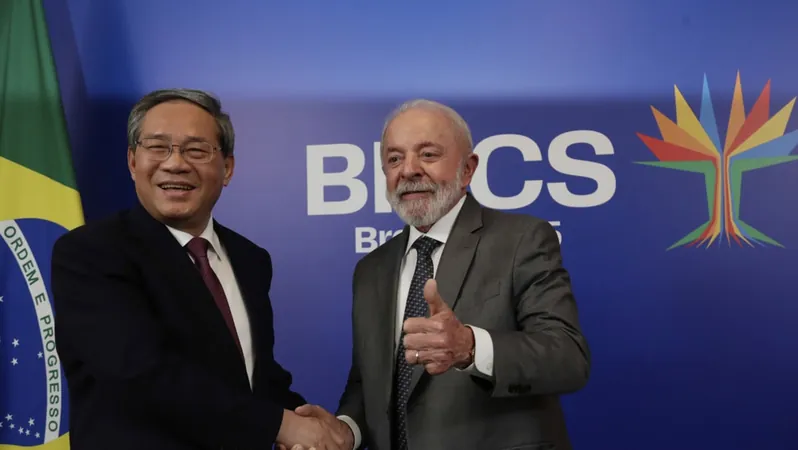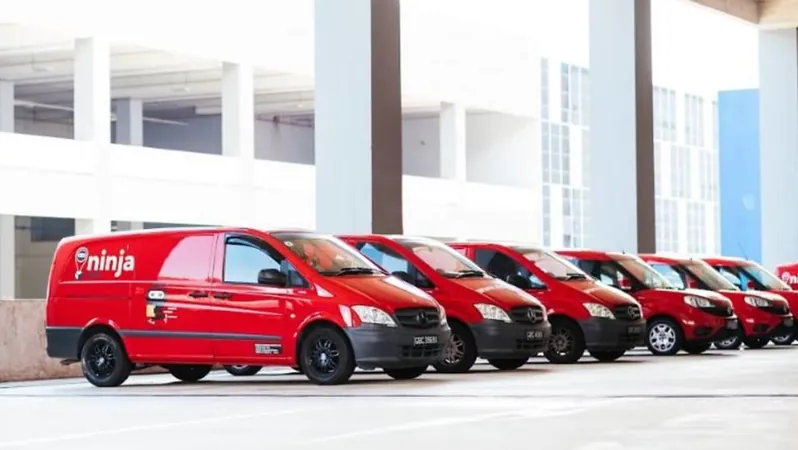
BRICS Leaders Unite in Rio: Championing Multilateralism Amid Global Tensions
2025-07-06
Author: Yu
In a pivotal gathering in Rio de Janeiro, the expanding BRICS coalition of developing nations is rallying to reform traditional Western institutions, while declaring themselves as champions of multilateralism in an increasingly fragmented global landscape.
As groups like the G7 and G20 struggle with internal divisions and the unpredictable "America First" policy under President Trump, BRICS is rapidly creating new avenues for diplomatic collaboration. Brazilian President Luiz Inacio Lula da Silva emphasized this on Saturday, stating, "In the face of rising protectionism, it is our duty as emerging nations to defend the multilateral trade system and overhaul the current international financial framework."
Now, BRICS nations represent over half of the world's population and account for a staggering 40% of global economic output. Originally starting with Brazil, Russia, India, and China in 2009, the bloc has since welcomed South Africa, and in the past year, added Egypt, Ethiopia, Indonesia, Iran, Saudi Arabia, and the UAE as full members—marking Indonesia's first leaders' summit.
A Brazilian diplomat noted, "The void left by others is rapidly filled by the BRICS," highlighting the shifting dynamics as the G7 loses its prior dominance.
However, the growing diversity within BRICS raises concerns about shared objectives, particularly as it encompasses regional rivals and differing national interests.
Chinese President Xi Jinping opted to send his Prime Minister instead of attending, while Russian President Vladimir Putin joins the discussions online due to an arrest warrant from the International Criminal Court.
Nevertheless, significant leaders from around the world, including Indian Prime Minister Narendra Modi and South African President Cyril Ramaphosa, are converging at Rio's Museum of Modern Art for substantive discussions.
More than 30 nations have expressed interest in joining the BRICS, whether as full members or partners, signaling its growing influence.
With Brazil also preparing to host the UN climate summit in November, the nation aims to spotlight how developing countries are actively confronting climate change, a stark contrast to the US's retreat from environmental responsibility under Trump.
During the summit, discussions hinted at major investments from both China and the UAE into Brazil's proposed Tropical Forests Forever Facility, aimed at conserving vital endangered ecosystems worldwide.
Yet, the expansion of BRICS adds complexity to achieving consensus on contentious geopolitical matters. Negotiators reportedly faced challenges in agreeing on a unified statement regarding the Gaza bombings, the Israel-Iran conflict, and proposed reforms of the Security Council.
To mediate differences among African nations concerning a representative for the Security Council, BRICS leaders decided to back seats for Brazil and India while leaving the African representation open to discussion.
The coalition continues to subtly criticize Trump’s tariff policies, expressing concerns about "unjustified unilateral protectionist measures" at previous meetings.




 Brasil (PT)
Brasil (PT)
 Canada (EN)
Canada (EN)
 Chile (ES)
Chile (ES)
 Česko (CS)
Česko (CS)
 대한민국 (KO)
대한민국 (KO)
 España (ES)
España (ES)
 France (FR)
France (FR)
 Hong Kong (EN)
Hong Kong (EN)
 Italia (IT)
Italia (IT)
 日本 (JA)
日本 (JA)
 Magyarország (HU)
Magyarország (HU)
 Norge (NO)
Norge (NO)
 Polska (PL)
Polska (PL)
 Schweiz (DE)
Schweiz (DE)
 Singapore (EN)
Singapore (EN)
 Sverige (SV)
Sverige (SV)
 Suomi (FI)
Suomi (FI)
 Türkiye (TR)
Türkiye (TR)
 الإمارات العربية المتحدة (AR)
الإمارات العربية المتحدة (AR)